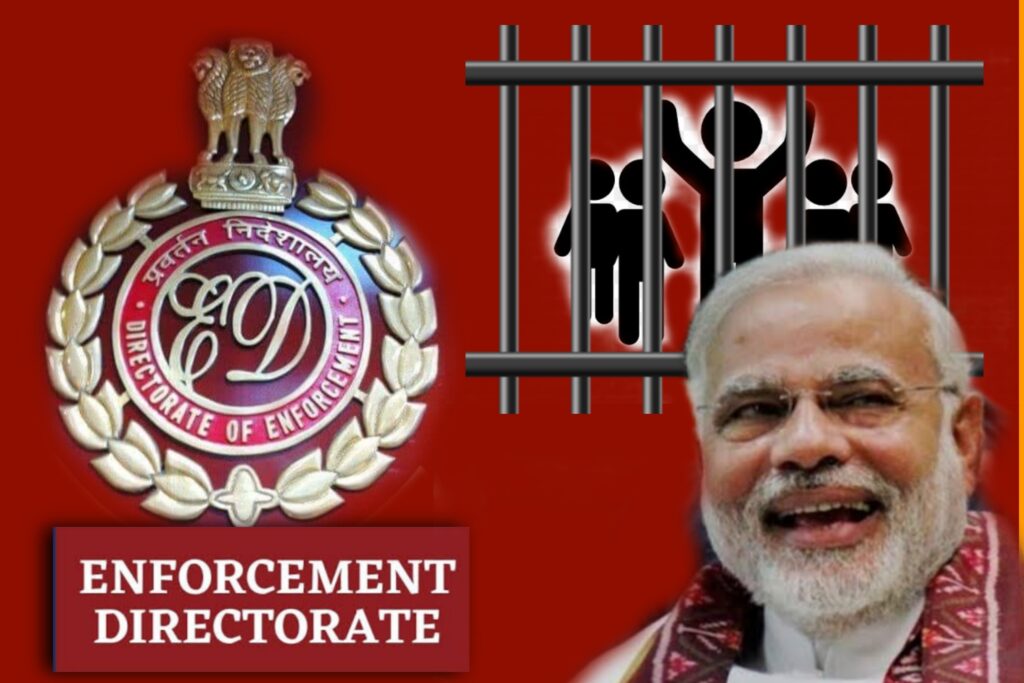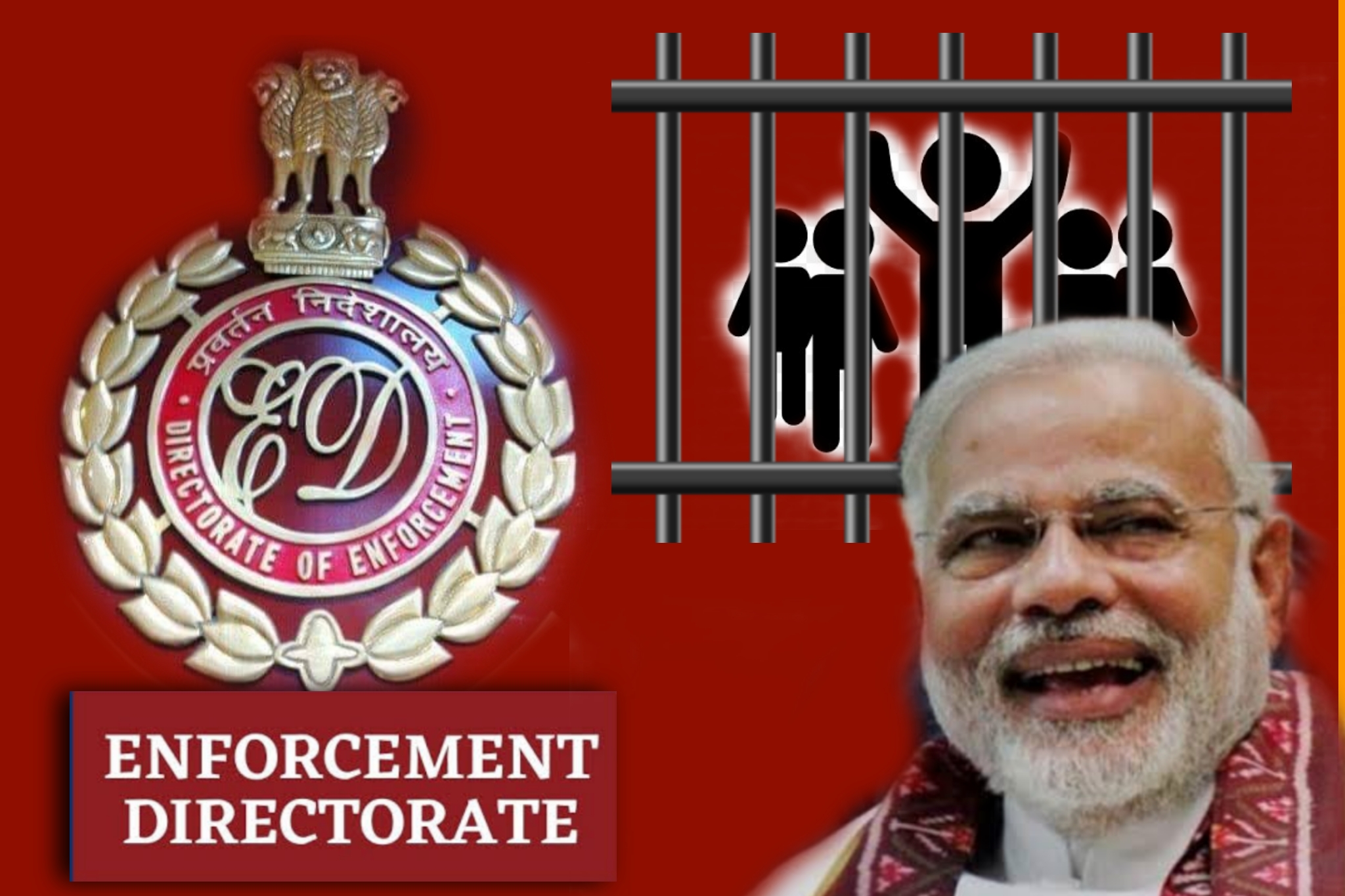
The Erosion of Credibility
For years, the Enforcement Directorate (ED) has operated as one of India’s most powerful investigative agencies, but its credibility is increasingly under fire. The opposition’s longstanding mistrust has now found a powerful ally in the Supreme Court, which has started to openly question the agency’s impartiality. The court’s comments while granting bail to key figures like Sanjay Singh, Manish Sisodia, and K. Kavitha in the Delhi liquor scam have sparked widespread debate about the integrity of the ED’s investigations. These judicial observations don’t just challenge the ED—they indirectly criticize Prime Minister Narendra Modi, who has frequently defended the agency’s actions as beyond reproach.
ED’s Selective Targeting: A Flawed Process
The heart of the controversy lies in the ED’s practice of turning certain accused individuals into government witnesses, thereby securing their bail while others languish in jail based on these testimonies. This issue was front and center during the Supreme Court’s hearing on K. Kavitha’s bail plea. The court expressed serious concerns about the impartiality of the prosecution, questioning how the ED selects certain individuals to be government witnesses, allowing them to escape the full force of the law. Justice BR Gavai pointedly remarked, “Tomorrow you will pick up anyone at your will and make him a witness. You cannot select any accused and make him a witness.” This comment casts a long shadow over the ED’s methods, suggesting that the agency’s decision-making process is anything but fair or transparent.
This troubling pattern was also evident in the cases of Sanjay Singh and Manish Sisodia. The ED’s reliance on testimonies from individuals like Dinesh Arora, who accused Singh only after being made a government witness, raises serious doubts about the credibility of the evidence used to justify arrests. Sanjay Singh’s lawyer, Abhishek Manu Singhvi, highlighted that Arora’s statements were inconsistent, with Singh’s name being mentioned only after Arora was taken into judicial custody. Despite this, Arora was granted bail after turning witness, a scenario that underscores the selective and perhaps manipulative practices within the ED.
A String of Judicial Rebukes
The Supreme Court’s scrutiny of the ED’s conduct became particularly pronounced in the cases of Sanjay Singh, Manish Sisodia, and K. Kavitha—prominent political figures embroiled in the Delhi liquor policy scam. These cases have become emblematic of what many see as the ED’s selective and biased approach to investigations.
In March, K. Kavitha, the daughter of former Telangana Chief Minister K. Chandrashekhar Rao and a leader of the Bharat Rashtra Samithi, was arrested in connection with the scam. Despite spending five months in jail, she was granted bail on August 27, 2023, by a division bench of the Supreme Court comprising Justice B.R. Gavai and Justice K.V. Viswanathan. The court did not mince words, questioning the impartiality of the prosecution, including the ED and the CBI, and raising doubts about the selection of government witnesses. Justice Gavai’s pointed remarks—suggesting that the prosecution cannot arbitrarily choose who to prosecute and who to turn into witnesses—struck at the heart of the ED’s credibility.
The bench’s concerns are not unfounded. Many of those arrested in the Delhi liquor scam were quickly made government witnesses, and as soon as they did, they were granted bail. This pattern, observed by the Supreme Court, highlights a troubling trend: the ED’s apparent manipulation of the legal process to secure convictions or, at the very least, to keep certain individuals behind bars while others walk free.
Manipulating the Legal Process
The most striking example of this manipulation is the case of Dinesh Arora. Initially, Arora did not mention Sanjay Singh’s name in multiple statements. However, after being sent to judicial custody, he suddenly implicated Singh, leading to Singh’s arrest. Arora was subsequently made a government witness and granted bail in August 2023. Sanjay Singh’s lawyer, Abhishek Manu Singhvi, argued that this change in testimony—after Arora became a government witness—demonstrated the ED’s willingness to use dubious tactics to secure arrests. Singhvi described Arora as the “star witness” of the ED, whose testimony was crucial in the agency’s case. Yet, this testimony appeared to be more a product of coercion than of fact.
The case of Sharad Reddy of Aurobindo Pharma further underscores these concerns. Reddy’s company reportedly donated ₹55 crore to the BJP, yet he was quickly pardoned and granted bail after becoming a government witness. This sequence of events raises uncomfortable questions about the relationship between political donations and the ED’s investigative zeal—or lack thereof—when it comes to ruling party allies.
A Broader Pattern of Bias?
The Supreme Court’s concerns are not limited to the ED’s conduct in the Delhi liquor scam. The court has also criticized the broader judicial process, particularly the trial courts and the High Courts, for their handling of bail petitions. Justice Gavai pointed out that lower courts often fail to consider the delay in trials when deciding on bail, leading to a situation where bail petitions pile up in the Supreme Court. The principle that “bail is the rule, jail is the exception” seems to have been overlooked by many trial courts, leading to prolonged incarcerations without trial—a serious violation of the principles of justice.
In the case of K. Kavitha, the Supreme Court also took issue with the Delhi High Court’s interpretation of Section 45A of the Prevention of Money Laundering Act (PMLA), which provides special consideration for women in bail matters. The High Court had argued that this provision did not apply to “women of high status,” a stance the Supreme Court found untenable. Justice Gavai warned that courts must exercise judicial discretion properly and not deny bail based on such flawed reasoning.
The court’s criticism extended beyond the ED to the government’s defense of the agency. Prime Minister Modi has frequently defended the ED and other investigative agencies, framing them as essential tools in the fight against corruption. However, the Supreme Court’s comments suggest that these agencies may be overstepping their bounds, becoming instruments of political repression rather than impartial enforcers of the law.
ED’s Handling of Cases Comes Under Scrutiny Amid Broader Criticism of Modi Government’s Defense of the Agency
Ranchi, Jharkhand—After spending five months in custody, Jharkhand Chief Minister Hemant Soren was granted bail by the Jharkhand High Court, which cited a lack of concrete evidence against him. This ruling not only casts doubt on the handling of Soren’s case by the Enforcement Directorate (ED) but also highlights broader concerns about the agency’s functioning under the Modi government, which has consistently defended its actions.
The Jharkhand High Court’s decision to grant bail to Hemant Soren was accompanied by sharp criticism of the ED, the central agency responsible for investigating economic offenses. The court pointed out that despite the prolonged investigation, the ED failed to present substantial evidence to justify Soren’s continued detention. This lack of concrete evidence led the court to question the integrity and efficacy of the investigation.
Also Read : — A Threat to Justice and Democracy
Supreme Court’s Critique of the ED in Other Cases
The Jharkhand High Court’s ruling is not an isolated instance of judicial criticism directed at the ED. In the case of the Chhattisgarh ration scam, the Supreme Court, particularly the bench of Justice S. Abdul Nazeer and Justice A.S. Oka, took the ED to task for its handling of the investigation. The court pointed out that despite four years of investigation, the trial had not even begun, raising serious questions about the agency’s efficiency and intent.
This pattern of judicial censure paints a troubling picture of the ED’s conduct, especially in cases involving opposition leaders or those who are politically at odds with the central government. The recurring criticism from various levels of the judiciary indicates a broader concern that the ED’s investigations may be influenced by political considerations rather than being driven purely by the pursuit of justice.
Why Are Delhi Riots Accused Still in Jail?
A crucial question emerges: why does the precedent of granting bail, as seen in cases like Hemant Soren’s, not apply to those accused in the Delhi riots cases? Individuals such as Gul Fisha, Fatima, Meeran Haider, Abdul Khalid Saifi, Umar Khalid, Sharjeel Imam, Mohammad Salim Khan, Salim Malik, Shifa ur Rehman, Shadab, and Ahmed Athar Khan have been imprisoned for over four years. Despite numerous bail applications, their pleas have been repeatedly denied or delayed.
Take the case of Meeran Haider, whose bail plea has been listed 60 times but only heard four times, often postponed due to reasons like the unavailability of a special bench or a judge being on leave. Recently, on August 25, Haider was granted interim bail for just ten days, not on the merits of the case but on humanitarian grounds, following the death of his sister’s newborn child. Such delays and denials raise serious concerns about the fairness of the judicial process and whether the principle that “bail is the rule and jail is the exception” is being selectively applied.
The Broader Implications for Indian Democracy
The repeated judicial rebukes of the ED, especially in high-profile cases involving opposition leaders, social activists, and journalists, suggest a pattern of behavior that cannot be ignored. The agency’s selective targeting of certain individuals, the questionable use of government witnesses, and the frequent delays in trials all point to a deeper issue within the institution. This is not merely a matter of individual cases—it reflects a systemic problem that threatens the very foundations of India’s democracy.
As courts continue to expose and reject autocratic actions by investigative agencies, it becomes crucial to remember the many innocent lives that may have been caught in the crossfire. The discussion around these issues should not be confined to the courtroom but should resonate across all levels of society, demanding accountability, transparency, and a steadfast commitment to upholding the rule of law.
The erosion of the ED’s credibility is not just a legal issue—it is a political and moral crisis. The agency must be held accountable, not just by the courts but by the public and the political establishment. The time has come to restore faith in India’s investigative agencies, ensuring that they serve the cause of justice rather than the interests of those in power. The Supreme Court’s scathing critique is a reminder that the rule of law must prevail, and that no agency, however powerful, is above scrutiny.

